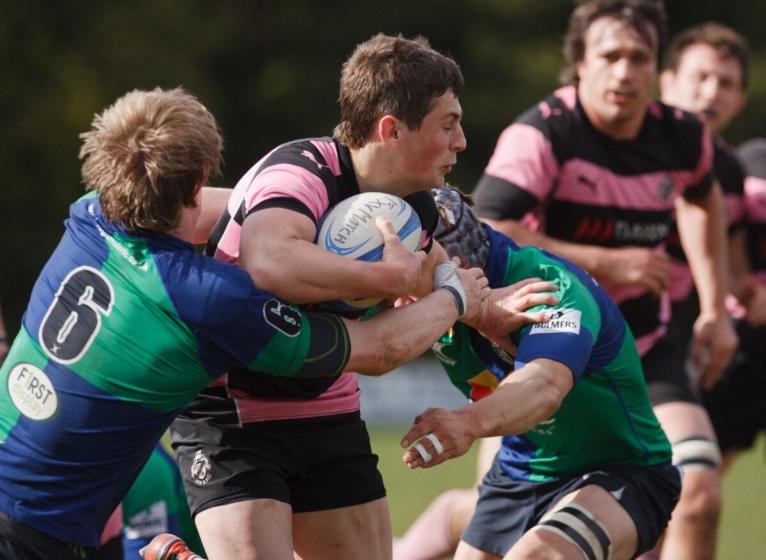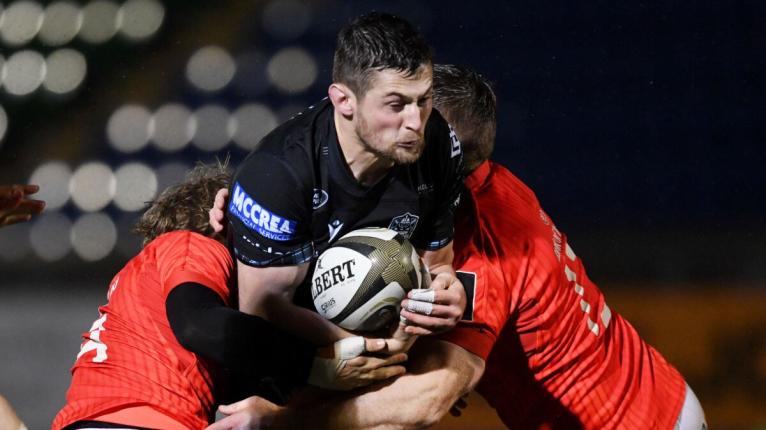For Robbie Fergusson, vomiting on the pitch was the final straw that gave way to a cancer diagnosis at 20

Robbie Fergusson drifted out of the GP surgery utterly stupefied, as though the entire Melrose pack had just trampled over the top of him.
“You’ve got this lymphoma in you,” the doctor had said, mousing over an x-ray of his chest. Her words were calm and soft and yet to the young man in the chair opposite, completely deafening. “It’s a type of cancer.”
Fergusson was twenty years old back in the spring of 2013. A shooting star at Ayr, and part of the Scotland Under-20s midfield, he had already been touted to win senior Test honours.
He staggered trance-like from the practice that day, his world rapidly collapsing around him. Hodgkin’s Lymphoma is a relatively rare form of cancer that begins with the mutation of an infection-fighting white blood cell, and spreads through the lymphatic system – the body’s transportation channels which play a major role in immune defence. The cancer began in the lymph nodes in Fergusson’s neck and snaked its way to his chest.
“The doctor is saying it so casually to me, and I am sitting there like… shell-shocked,” Fergusson tells RugbyPass. “She said they’d be in contact again with dates to see a specialist. I was in there for about 15-20 minutes, and then I just wandered out.
“I sat in the car for a bit and I was like, right, what does this even mean? I didn’t know what was going on. How do I even tell her?
“I got home, and it was just me and my sister in the house. I told her and she ran away crying. Eventually she phoned my mum and let her know. That was definitely the worst holiday she’d ever had.”
For several months leading up to his diagnosis, Fergusson had known something was profoundly wrong. The fits of hacking coughs, sometimes so bad that he would run out of puff climbing the stairs. The sweaty film that would coat his body every night. The relentless fatigue that leeched his energy and the muscle that atrophied from his frame no matter how much iron he shifted in the gym.
It all came to a head one afternoon in the Scottish borders. Ayr trundled south to Gala. Fergusson felt the usual crippling exhaustion, and vowed to push through it again. That was until he began warming up and promptly vomited all over the Netherdale pitch.
“I remember walking past the committee members at the front of the bus and them saying that I was white as a sheet, and was I ok,” he says. “I was knackered, fatigued, dead pale. I’d been to the doctor three or four times and been diagnosed with chest infections, asthma, all these different things.
“But I’d never thrown up like that before. It was a real wake-up call. We pressed things with the doctors again, got bloods taken, then a chest x-ray – and that’s what highlighted the two tumours.
“One was in my chest, but the other was in my neck. It was pressing on my windpipe, getting bigger and bigger. My windpipe was compressed so I was getting less and less air, which is why I was getting so tired and struggling to breathe.”
From that point, things began to motor. Fergusson was hooked up to an infusion pump for five hours at a time, once a fortnight, for six months, the machine deploying its battalions of drugs off to wage war against the cancer.

His fiancée, Gabriella, never missed a session. Boys from the club would come down for a joke and a chat, and make sure that while Fergusson could not take the field with his brothers, he was always immersed in the club. Ayr held huge fundraisers and were there for the whole clan.
Fergusson stayed as active as the treatment would allow until, midway through the cycle, salvation arrived. The chemotherapy was working, chiselling away the cancerous cells in his neck and chest. A full recovery was confidently predicted.
“I felt so bad before the chemo started that after a few rounds, I felt so much better,” he says. “I was in the local gym all the time, I did 5km runs with my sister. Don’t get me wrong, the chemo was hellish, it would floor you for two or three days, but I’d always feel better if I did something. I knew that if I lay there and didn’t do anything, then it would just become a cycle.
'There’s a huge emphasis on not T-boning into folk because running into the Pacific Islanders straight-on as a wee Scottish lad is not fun'
Options ran out for 6'5 @hamilton_burr in Scotland. Now he's in NZ, training alongside ABs, writes @JLyall93 ???https://t.co/NBIhXovLrf
— RugbyPass (@RugbyPass) August 2, 2020
“There was a six-week block halfway through my chemo when I was told, ‘You’re nailing this, you’ll be absolutely fine when you finish this treatment’. You are sitting in a room with eight or nine people, and there are hundreds of different types of chemo. You can see things being done to them and you’re like, I do not want that. It was a massive sigh of relief knowing that it was working, and I could go back to my normal life when I finished it.”
Millbrae erupted when, seven months after his diagnosis, Fergusson trotted off the bench in a rousing beating of Currie. His ordeal over; his comeback complete. A club and a people flanking him all the way.
“My family was there, a big crowd was there – everyone at the club had sort of been through it with me,” he says. “I’d been at Ayr since I was in primary four – eight or nine years old – so the old boys knew me, ex-players knew me, I coached the youth teams.
“I came off the bench with about 20 minutes to do and there was a big roar, which was lovely, and for my family to see me go back out there was the moment of relief for them – he is back to what he does.”
In the years that followed, Fergusson flitted from the fringes of Glasgow Warriors to London Scottish, and then to the national sevens squad. Dynamic, quick-witted and explosive on both sides of the ball, he became one of Scotland Sevens’ go-to men and then their captain. He played at the Commonwealth Games in 2018 and he yearns to make the cut for Tokyo next summer.
With sevens in a state of suspension, Fergusson was seconded back to Glasgow for the new season. Danny Wilson’s squad has been stretched to its limits and then stretched some more. The centre has seized his opportunities these past few weeks and reignited his drive to become a XVs regular again someday.
For @RugbyPass, Matt Scott on the maddening nature of his Edinburgh exit.
'My wife was really looking forward to staying for another three years and we were looking to start a family. It was just gutting, to be honest.'https://t.co/gIkGXER6j7
— Jamie Lyall (@JLyall93) June 28, 2020
Glasgow begin their Champions Cup voyage against the irrepressible Exeter Chiefs on Sunday. Scarcely could they have drawn a tougher opponent. Scarcely can Fergusson believe that, after a spree of compelling displays in the Pro14, he is a strong contender to play at Sandy Park.
“If you’d asked me four weeks ago about trying to cement a Glasgow starting place, I’d have laughed at you,” he says. “It would have been mental. But through the opportunity I’ve had, I have really wanted to focus on these four Pro14 games during the Autumn Nations Cup. I hadn’t thought much beyond that.
“I’m trying to play as well as I can and off the back of that, hope that I give coaches selection headaches, so it’s not just, ‘Good, Sam Johnson’s back from Scotland, get him in’. I just want to keep building week on week, and if I get a crack in one of those big games, that’s class, let’s make the most of it.”
He doesn’t often talk about all that he has surmounted. When he does, the Ayrshire lads are all over him faster than the most smothering Exeter blitz defence.
Even now, from time to time, Fergusson’s phone chirps and a photo of his eyebrow-less, chemo-ridden former self appears in a WhatsApp group.

“Aye, boys,” he says. “It’s funny now!
“I don’t want it to be, aw, he’s just a sob story, he’s only being interviewed because he’s had cancer. I’ll no doubt get the WhatsApps from the boys getting stuck into me when a story comes out – ‘Here he is again’. They need some new material.”
This is how rugby players deal with trauma. Ruthless teasing is their hearty medicine.
The wretched days in the grip of chemotherapy shaped Fergusson. They steeled him for the challenges he would face in sport. They taught him the true meaning of suffering.
“It’s part of my journey,” he says. “I do find it useful when you end up in some dark places, especially in sevens – you lose three games in the last minutes, your body is smashed all over the place, and you know you have to get up at 6am the next day and do it all over again.
“Being a bit sore, training in the Glasgow rain on a Sunday, being a bin-juice guy on a back pitch flogged with fitness with nobody watching you. It seems crap at the time, but it’s where I want to be.
“Think of where I have been – I could be strapped to a chair getting chemo for five hours, being sick. I could have Covid-19 or whatever else. It’s a bit of a reality check. Enjoy it and get on with it.
“I don’t think I’d be where I am if what happened hadn’t happened. It does make you appreciate things and take opportunities more. I’m pleased it happened and it is part of where I’m going in rugby.”
If Fergusson does face the Chiefs, he will stride out in Devon knowing that whatever the Exeter juggernaut should throw at him, he has conquered a far greater foe.











































































